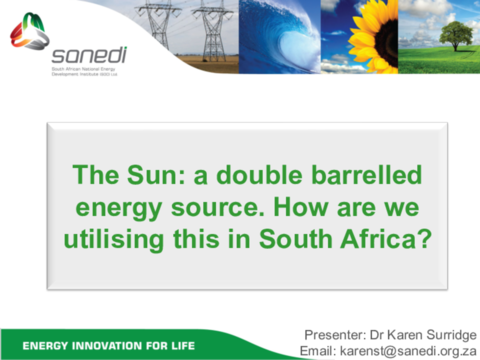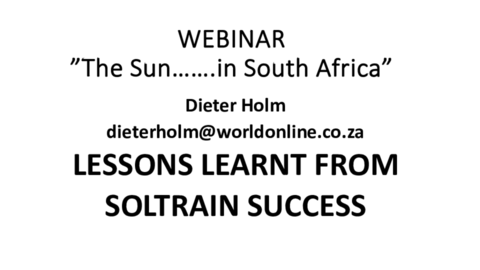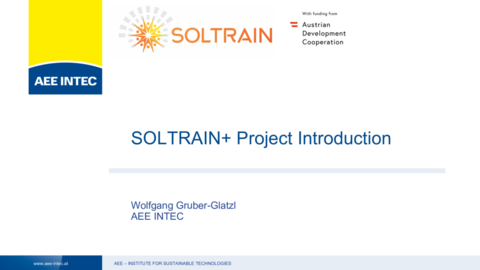
The Sun: a double barrelled energy source. How are we utilising this in South Africa?
This webinar is aimed at giving a brief overview of the energy situation in South Africa. It will then focus on the utilization of solar energy in support towards energy security for the country. One of the main focus areas willd include the SOLTRAIN project and its initiatives with pilot and demonstration facilities in southern Africa. Lessons learned of solar thermal in South Africa.
Speakers
Monica Oliphant (Moderator)
Monica Oliphant worked 18 years for electricity utility ETSA as a Research Scientist, prior to privatisation. She was President of the International Solar Energy Society (ISES) 2008/09 and currently is on the IRENA (International Renewable Energy Agency) Coalition for Action Steering Committee and represents ISES on the World Wind Energy Association Board. She is Patron of crowdfunding initiative CORENA – Citizens Own Renewable Energy Network Australia. Monica received an Order of Australia (AO) in 2015 and was 2016 Senior South Australian of the Year. In 2018 she received an Honorary Doctorate from the University of South Australia.
Karen Surridge

Dr Karen Surridge was awarded her PhD in 2007 and her academic career was paralleled by establishing a consulting company specialising in environmental analyses, environmental impact assessments (EIA’s), laboratory setup and establishment and consulting to, among others, large energy, environmental consulting and metal industries in South Africa. It offered environmental compliance services in mega industries like steel, energy and mining with scarce expertise in soil amelioration for crude oil contaminated soils, for example and other highly specialised skills related to microbial aspects of environmental impact and restoration.
Because her skills varied between both the engineering and microbiology side of extractives as well as energy, Dr Surridge has been able to smoothly transition from the lab to the grid – leading and collaborating with different teams of pioneering researchers and engineers who test and pilot energy solutions that align with the United Nations Sustainable Development Goals; and South Africa’s energy security, efficiency and technological innovation needs. This includes projects to demonstrate sustainable technologies that are fit for purpose in South Africa. In collaboration with researchers and various international agencies, she has led to the successful piloting of sustainable energy and efficiency solutions to lower the country's greenhouse gas emissions and support a Just Energy Transition.
Karen will present the double barelled approach of solar in South Africa and solar as a meassure of energy security.
Dieter Holm

Dieter Holm is Emeritus Professor and Head of Research and Post Graduate Studies at the Division Environmental Design and Management, University of Pretoria. He served as ISES Secretary and Vice-President for Conferences, hosted the ISES Solar World Congress 2009 and authored the ISES White Paper “Renewable Energy Future for the Developing World”, which has been translated into many languages. He is a previous President of the Sustainable Energy Society of Southern Africa and was the local coordinator for the SOLTRAIN Solar Water Heating Programme in Southern Africa. Currently, he and his family live in the first modern energy and water-autonomous house on the African continent, built in 1974.
Dieter will present lessons learned about solar thermal in Southern Africa.
Wolfgang Gruber-Glatzl

Wolfgang Gruber-Glatzl graduated in "Energy and Environmental Management" at the FH Burgenland. Since 2013 he has been working as a Research Assistant and Project Manager at AEE - Institute for Sustainable Technologies. His focus in the area of industrial systems includes energy and resource efficiency as well as innovative process and supply systems. He also supervises projects focusing on industrial and municipal wastewater treatment plants and the use of innovative supply and technology concepts.
During the webinar, Wolfgang will introduce the SOLTRAIN project.


